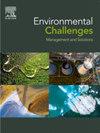Willingness to pay for post-mining landscape restoration
Q2 Environmental Science
引用次数: 0
Abstract
This paper examines the long-run impacts of mining-induced displacement and resettlement and uses the contingent valuation method to estimate displaced and resettled Mozambican households’ willingness to pay (measured in labour) to restore the landscape where they used to live before mining began there. Previous studies found that resettlement worsened the welfare of the communities affected, but these studies have generally been conducted shortly after the resettlements concerned had taken place while this study looks at longer-run impacts. The study results indicate that, on average, households were willing to contribute about nine working days per month. The results further indicate that resettled respondents had been adaptive and had used the monetary compensation they were given for resettlement to buy productive land to offset that lost due to resettlement. However, they still saw themselves as worse off than before their relocation. One explanation for this is that they are now far from marketplaces and the river, making it difficult to develop new sources of income and have access to water. Mitigation interventions and future resettlements should therefore think more carefully about selecting resettlement sites.
愿意支付采矿后景观恢复费用
本文考察了采矿引起的流离失所和重新安置的长期影响,并使用条件评估方法来估计流离失所和重新安置的莫桑比克家庭支付(以劳动力衡量)以恢复采矿开始前他们曾经居住的景观的意愿。以前的研究发现,重新安置会使受影响社区的福利恶化,但这些研究通常是在有关重新安置发生后不久进行的,而本研究则着眼于长期影响。研究结果显示,平均而言,家庭每月愿意贡献约9个工作日。结果进一步表明,被重新安置的回答者具有适应性,并利用重新安置给予的货币补偿购买生产性土地,以抵消因重新安置而造成的损失。然而,他们仍然认为自己的处境比搬迁前更糟。对此的一种解释是,他们现在远离市场和河流,很难开发新的收入来源,也很难获得水。因此,缓解干预措施和未来的重新安置应更仔细地考虑选择重新安置地点。
本文章由计算机程序翻译,如有差异,请以英文原文为准。
求助全文
约1分钟内获得全文
求助全文
来源期刊

Environmental Challenges
Environmental Science-Environmental Engineering
CiteScore
8.00
自引率
0.00%
发文量
249
审稿时长
8 weeks
 求助内容:
求助内容: 应助结果提醒方式:
应助结果提醒方式:


